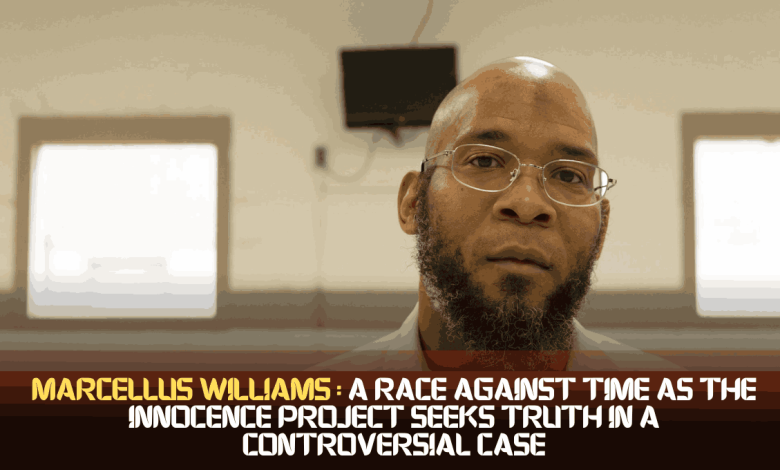Marcellus Williams: A Race Against Time as the Innocence Project Seeks Truth in a Controversial Case

The case of Marcellus Williams has captured national attention, igniting debates about the death penalty, wrongful convictions, and systemic issues within the justice system. As Williams faces execution despite maintaining his innocence for over two decades, the Innocence Project is fervently working to uncover the truth surrounding his conviction for the 1998 murder of Felicia Gayle, a former newspaper reporter. This article delves into the complexities of the Williams case, the role of the Innocence Project, and the critical implications for the broader conversation about justice in America.
The Conviction of Marcellus Williams
In 2001, Marcellus Williams was convicted of murdering Felicia Gayle, whose body was discovered in her home, brutally stabbed. The evidence against Williams was largely circumstantial, relying on witness testimony and DNA evidence that was not definitively linked to him. Williams has consistently proclaimed his innocence, asserting that he had no involvement in Gayle’s death. Despite numerous appeals and claims of judicial error, Williams was sentenced to death.
Eyewitness Testimony and Its Flaws
Eyewitness testimony is often considered a powerful form of evidence in court. However, in the case of Williams, it became a point of contention. Witnesses provided conflicting accounts, and the reliability of their testimonies was called into question during the appeals process. The Innocence Project argues that flawed eyewitness identification can lead to wrongful convictions, a phenomenon that has been documented in numerous cases across the United States.
The Role of the Innocence Project
The Innocence Project, founded in 1992, aims to exonerate individuals wrongfully convicted of crimes through DNA testing and advocacy for criminal justice reform. In the case of Marcellus Williams, the organization has played a pivotal role in bringing attention to his situation, advocating for a re-examination of the evidence, and fighting for his right to a fair trial.
Recent Developments in Williams’ Case
Recent developments have brought renewed hope for Williams and his supporters. In early 2024, St. Louis County Prosecuting Attorney Wesley Bell filed a motion to vacate Williams’ conviction, citing the need for further DNA testing on the murder weapon. The motion argued that new testing could potentially exclude Williams as the perpetrator, a critical aspect in the pursuit of justice.
However, during a subsequent circuit court hearing, complications arose. It was revealed that the murder weapon had been mishandled, contaminating the DNA evidence that was meant to support Williams’ innocence. This revelation highlights the systemic failures that can occur in criminal investigations and the urgent need for reform in the handling of evidence.
The Challenge of Racial Bias
One of the most pressing issues in the Williams case is the potential for racial bias in the judicial process. Williams, a Black man, has raised concerns regarding the racial dynamics at play during his trial. His legal team contends that there were instances of juror discrimination, particularly in the exclusion of Black jurors from the trial. This raises significant questions about the fairness of his trial and the broader implications for racial equity in the criminal justice system.
The Impact of Racial Dynamics on Justice
Racial bias in jury selection and sentencing has been a longstanding issue in the American judicial system. Studies have shown that Black defendants are disproportionately affected by harsh sentencing practices, including the death penalty. The case of Marcellus Williams underscores the urgent need for reforms that address these disparities and promote a more equitable justice system.
Public Outcry and Advocacy
As the execution date looms, public outcry has intensified. Advocacy groups, including the NAACP and various civil rights organizations, have rallied to support Williams, calling on Governor Mike Parson to grant clemency. Their efforts emphasize the moral imperative of ensuring that justice is served, particularly in cases where there is a possibility of executing an innocent person.
Clemency Appeals and Legal Battles
In September 2024, Williams’ legal team filed a clemency petition with the U.S. Supreme Court, arguing that due process rights had been violated throughout the legal proceedings. They highlighted the previous governor’s efforts to investigate Williams’ case and the abrupt termination of that investigation by the current administration. The clemency petition underscores the ongoing struggle for justice and the urgent need for systemic reforms.
The Broader Implications for Capital Punishment
The case of Marcellus Williams is not just about one man’s fight for his life; it is emblematic of the broader issues surrounding capital punishment in the United States. With at least 200 individuals exonerated after being sentenced to death since 1973, the risks associated with the death penalty are becoming increasingly apparent.
Wrongful Convictions and the Need for Reform
Wrongful convictions highlight the flaws in the judicial process, underscoring the necessity for reforms in how evidence is collected, presented, and evaluated. The Williams case, along with others like it, serves as a powerful reminder of the need for transparency, accountability, and comprehensive reforms to prevent future injustices.
Conclusion: A Call for Justice
As Marcellus Williams faces execution, the urgency for truth and justice intensifies. The Innocence Project and numerous advocacy groups continue to fight for his exoneration, shining a light on the systemic issues within the criminal justice system. The outcome of this case could have far-reaching implications for the future of capital punishment, the fight against wrongful convictions, and the pursuit of racial equity in justice.
The fight for Marcellus Williams is a call to action for all who believe in justice. We must collectively advocate for a system that values truth over expediency, ensuring that no innocent person is wrongfully punished for a crime they did not commit.
Also read



